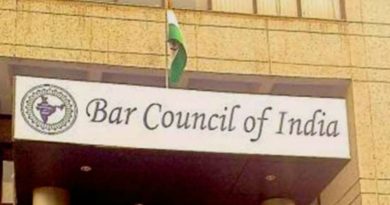Asaduddin Owaisi Challenges Waqf Amendment Bill in Supreme Court, Cites Violation of Constitutional Rights
(Judicial Quest News Network)
New Delhi,4, April,2025. In a momentous legal move, All India Majlis-e-Ittehad-ul-Muslimeen (AIMIM) Chief and Member of Parliament Asaduddin Owaisi has approached the Supreme Court, challenging the constitutionality of the recently passed Waqf Amendment Bill. The bill, which has cleared both houses of Parliament, is now awaiting presidential assent to become law.
Owaisi’s petition, filed through advocate Lzafeer Ahmed, argues that the amendment violates multiple constitutional provisions, particularly Articles 14, 25, 26, 29, and 300A, which guarantee the right to equality, freedom of religion, and the right to property.
Key Constitutional Concerns Raised
Owaisi asserts that the amendment infringes upon the rights of religious denominations, especially Muslims, by stripping Waqf properties of essential protections that are also afforded to Hindu, Jain, and Sikh religious endowments. He highlights that the bill undermines the autonomy of Waqf boards, imposing restrictions on their ability to manage properties effectively.
It is contended that Islam is a religion which is unique in that charity is not merely a prescription but a foundational pillar of the faith. The concept of waqf can be traced back to a system evolved in the earliest days of Islam by the Prophet (PBUH) to form a means for Muslims to give away their property for use of the larger Muslim community. It is universally acknowledged across sects that have now developed within Islam that the first waqf was created by Hazrat Umar bin Al Khattab on the instructions of the Prophet (PBUH) when Hazrat Umar expressed the desire that he wished to give away some valuable immovable property he held for benefit of the Muslim community.
Furthermore, the petitioner submits that “In our constitutional scheme, the right (i) to establish and maintain institutions for religious and charitable purposes, (ii) to manage its own affairs in matters of religion, (iii) to own and acquire movable and immovable property, and (iv) to administer such property in accordance with law is recognised as an independent right given to religious groups and denominations. Under Article 26 of the Constitution, only the right to administer in Article 26(iv) is qualified by the expression “in accordance with law”. It is this expression that must circumscribe the degree of interference permitted to the State in our constitutional scheme with the right of a religious group or denomination granted under Article 26”
“The amendment violates Article 26, which grants religious denominations the right to manage their own affairs,” Owaisi stated during a debate in the Lok Sabha. “Why are Muslims being denied the rights that are granted to other religious communities like Hindus, Jains, and Buddhists?”
He also criticizes the bill for enabling encroachers to claim ownership over Waqf properties, which he argues is a blatant violation of Article 14, the right to equality before the law. Furthermore, Owaisi contends that the inclusion of non-Muslims in Waqf boards and councils dilutes the religious integrity and administrative control that Muslim communities have historically exercised over their properties.
The petitioner avers that “The 1995 Act must also be seen as a law governing the private properties of a section of the citizens of the country. If the degree of interference by the State in the freedoms available to a citizen or a section of citizens in dealing with their private properties exceeds the constitutionally permissible threshold, the same constitutes a violation of Article 300A of the Constitution. Muslims, as a minority having their own distinct culture, also enjoy protection under Article 29 of the Constitution, and educational institutions established by them are protected under Article 30 of the Constitution. Constant and unjustifiable interference by the majority community into the life of the minority and various constitutionally protected forms of expression of their identity also interferes with their right under Article 21 of the Constitution to lead a life of dignity without unjustifiable interference by the State”
Broader Implications and Legislative Developments
The Waqf Amendment Bill, officially titled the Unified Waqf Management, Empowerment, Efficiency, and Development Act, seeks to amend the Waqf Act of 1995. Its stated goal is to improve the management and efficiency of Waqf boards and properties. However, critics argue that the amendments undermine the autonomy of Muslim religious institutions.
The bill proposes significant changes, including:
- Restricting the declaration of Waqf properties to individuals who have practiced Islam for at least five years.
- Removing provisions that allowed properties to be considered Waqf based on prolonged religious use.
- Allowing non-Muslims to hold key positions in Waqf boards, while limiting the role of Muslim scholars and representatives.
Owaisi’s legal challenge follows a similar petition filed by Congress MP Mohammad Javed, who also raised concerns about the bill’s discriminatory nature and its potential to infringe upon the fundamental rights of the Muslim community.
The Road Ahead
As the Supreme Court takes up the case, the legal battle over the Waqf Amendment Bill underscores the broader debate about religious freedoms, minority rights, and the role of government in managing religious endowments in India. The outcome of this case could have far-reaching implications for the administration of Waqf properties and the protection of constitutional rights for religious communities across the country.




